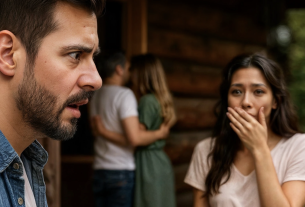On a rainy Saturday morning, James Whitmore, a tech billionaire and devoted single father, stepped into a small, quiet café nestled on a tranquil street. His daughter Lily walked beside him, her tiny hand tucked into his.
James hadn’t smiled much these days—not since Amelia, his cherished wife, was taken from them in a tragic car accident two years earlier. Life without her laughter, warmth, and voice had grown unbearably silent.
Lily, now four, was the sole spark of light in his world.
They settled into a booth by the window. James skimmed the menu, exhausted from another restless night, his mind elsewhere. Across from him, Lily softly hummed, twirling the hem of her pink dress between her fingers.
Suddenly, her voice broke through, quiet but certain:
“Daddy… that waitress looks just like Mommy.”
The words barely registered until they struck him like a thunderclap.
“What did you say, sweetheart?”
Lily pointed across the room. “There.”
James turned—and stopped cold.
Just a few feet away, a woman smiled warmly at another customer. She was the spitting image of Amelia.
The same gentle brown eyes. The same graceful stride. The same dimples that appeared only with a broad smile.
But it couldn’t be.
He had seen Amelia’s body himself, been to the funeral, held her death certificate.
Yet here she was—alive, breathing, laughing.
His gaze lingered too long.
At last, the woman noticed him. Her smile faltered for a fleeting moment, her eyes widened in recognition—or fear—then she quickly disappeared into the kitchen.
James’s heart pounded.
Could it really be her?
Was this fate’s cruel joke? A haunting coincidence? Or something far darker?
“Stay here, Lily,” he whispered.
Pushing past surprised patrons, he headed for the kitchen door—only to be stopped.
“Sir, you can’t go back there.”
James held up a hand. “I need to speak with the waitress—the one with the black ponytail, beige shirt. Please.”
The employee hesitated, then relented.
Minutes crawled by.
Finally, the door opened, and the woman stepped out. Up close, the resemblance was uncanny.
“Can I help you?” she asked cautiously.
Her voice was different—deeper—but those eyes were unmistakable.
“I… I’m sorry,” James stammered. “You look exactly like someone I used to know.”
She smiled politely. “That happens.”
James studied her. “Do you know Amelia Whitmore?”
Her eyes flickered. “No, sorry.”
He hesitated, then offered a business card. “If you remember anything, please call me.”
She declined it. “Have a good day, sir.”
And walked away.
But James noticed—the faintest tremor in her hand, the way she bit her lip just like Amelia did when nervous.
That night, sleep eluded him.
He sat beside Lily’s bed, watching her breathe, replaying the encounter endlessly.
Was it really her? If not, why did she look so startled?
He searched online but found nothing—no photos, no staff listings—just a name: Anna. A fellow waiter had called her that.
Anna.
A name that felt deliberate. Meaningful.
He called a private investigator.
“I need everything you can find on a woman named Anna, waitress at a café on 42nd Street. No last name yet. She looks just like my wife—who’s supposed to be dead.”
Three days later, the call came.
“James, I don’t think your wife died in that crash.”
Cold swept over him.
“What do you mean?”
“The traffic cam footage shows someone else driving. Your wife was a passenger, but her body was never officially confirmed. The ID matched hers, but dental records don’t. And Anna—the waitress? Her real name is Amelia Hartman. She changed it six months after the accident.”
James’s world spun.
His wife was alive.
Hiding.
Breathing.
The weight crushed him.
That night, he paced, haunted by one question: why?
The next morning, he returned to the café alone.
When she saw him, her eyes widened again, but she didn’t run. She nodded at a coworker, slipped off her apron, and gestured for him to follow outside.
They sat beneath a crooked tree behind the café.
“You know,” she said softly, “I always wondered when you’d find me.”
James searched her face. “Why, Amelia? Why fake your death?”
She looked away, voice trembling. “I didn’t fake it. I was supposed to be in that car. But I switched places with a coworker at the last minute—Lily had a fever. The crash happened hours later. The ID, the clothes—they were mine.”
James frowned. “So everyone thought you were dead.”
She nodded. “I found out when I saw the news. I froze. For a moment, I thought it was a gift—a way to escape.”
“Escape what?” His voice cracked. “Me?”
“No. Not you,” she said firmly. “The pressure—the media, the money, the constant smiling for cameras. I lost myself. I didn’t know who I was beyond being your wife.”
James was silent, stunned.
She continued, tears falling, “Seeing the funeral, you crying—I wanted to scream. But it felt too late. Too complicated. And when I saw Lily, I knew I didn’t deserve her. I’d abandoned her.”
He sat quietly, emotions swirling.
“I loved you,” he whispered. “I still do. And Lily—she remembers you. She said you looked like Mommy. What do I tell her?”
She wiped her tears. “Tell her the truth. That Mommy made a terrible mistake.”
James shook his head. “No. Come home. Tell her yourself. She needs you. And I think… I do too.”
That evening, James brought Amelia home.
When Lily saw her, she gasped, then ran into her mother’s arms.
“Mommy?” she whispered, clutching her tight.
Amelia wept. “Yes, baby. I’m here.”
James watched, heart breaking and healing all at once.
In the weeks that followed, the truth surfaced quietly.
James used his influence to resolve the legal complications around Amelia’s identity. No press, no headlines—just family dinners, bedtime stories, and second chances.
Amelia slowly found her way back—not as the woman she’d pretended to be, but as the woman she chose to become.
Though imperfect, it was real.
One night, after tucking Lily in, James asked, “Why now? Why stay this time?”
She looked up, steady. “Because this time, I remembered who I am.”
He raised an eyebrow.
“I’m not just Amelia Hartman the waitress, or Mrs. Whitmore the millionaire’s wife. I’m a mother. A woman who lost herself—and finally found the courage to come home.”
James smiled, kissed her forehead, and held her hand tightly.
And this time, she didn’t let go.



